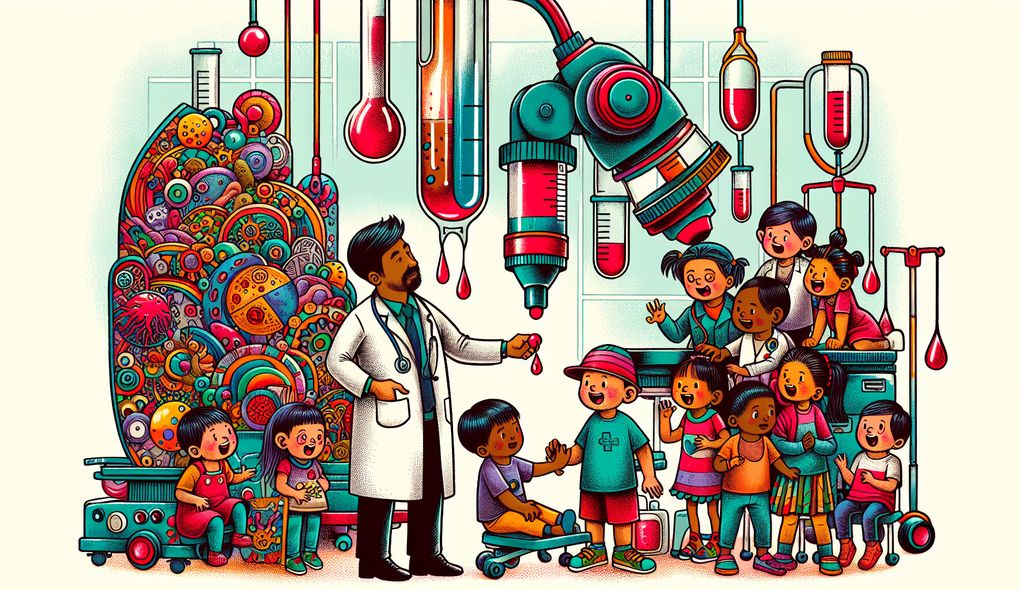What is the importance of maintaining strong ethical standards in pediatric hematology and oncology?
SENIOR LEVEL

Sample answer to the question:
Maintaining strong ethical standards in pediatric hematology and oncology is of utmost importance. As a hematologist/oncologist, it is crucial to prioritize ethical conduct in order to provide the best care for our young patients. Ethical standards ensure that the patient's well-being remains the top priority and that their rights and autonomy are respected. It also promotes trust and confidence between healthcare providers, patients, and their families. By upholding ethical standards, we foster a culture of integrity and professionalism within our field. Furthermore, ethical practices help to maintain the reputation of the medical profession and protect patients from potential harm or exploitation.
Here is a more solid answer:
Maintaining strong ethical standards is paramount in pediatric hematology and oncology. As a pediatric hematologist/oncologist, my expertise lies in providing comprehensive care for children and adolescents with blood disorders and cancer. By adhering to ethical principles, I ensure that my patients receive high-quality and patient-centered care. For example, when making treatment decisions, I prioritize the well-being of the child while considering their unique circumstances and preferences. Effective communication is key in maintaining ethical standards, as I collaborate with a multidisciplinary team and keep patients and their families informed about their diagnoses, treatment options, and potential side effects. By fostering a culture of respect, empathy, and shared decision-making, I build trust and establish strong relationships with my patients and their families. Upholding ethical standards also involves a commitment to patient safety, which I demonstrate through rigorous adherence to protocols, regular quality improvement initiatives, and continuous professional development to stay updated with the latest advancements in pediatric hematology and oncology. By maintaining professionalism and ethics, I contribute to the reputation of the medical profession and protect vulnerable patients from any form of harm or exploitation.
Why is this a more solid answer?
The solid answer expands on the basic answer by providing specific examples and details that demonstrate the candidate's expertise and practical application of ethical standards in pediatric hematology and oncology. It also highlights the candidate's commitment to patient-centered care, effective communication, patient safety, and continuous professional development. However, the answer could further emphasize the importance of ethical standards in research and the candidate's experience in leading clinical trials and research projects.
An example of a exceptional answer:
Maintaining strong ethical standards in pediatric hematology and oncology is not just a responsibility, but a moral obligation. As a respected and highly experienced pediatric hematologist/oncologist, I understand the profound impact of ethical conduct on the lives of our young patients. My extensive expertise in pediatric hematology/oncology allows me to navigate complex ethical dilemmas with utmost care and thoughtfulness. For instance, when faced with treatment decisions, I employ a holistic approach, considering not only medical factors but also the psychosocial and emotional well-being of the child and their family. Through compassionate and effective communication, I strive to create a shared decision-making environment, empowering families to actively participate in their child's care journey. Furthermore, I believe in the importance of research ethics and have led numerous clinical trials and research projects in the field. By upholding ethical standards in research, I ensure the integrity of the scientific process and generate evidence that drives advancements in pediatric hematology and oncology. In my commitment to patient safety and quality care, I continuously assess and improve clinical practices, adhere to rigorous safety protocols, and champion a culture of transparency and accountability. I also actively engage in professional development activities, attending conferences and workshops to stay abreast of the latest advancements and best practices in the field. By consistently demonstrating professionalism and ethics, I contribute to the reputation of the medical profession and inspire trust in my patients and their families.
Why is this an exceptional answer?
The exceptional answer goes above and beyond by highlighting the candidate's moral obligation and deep understanding of the impact of ethical conduct on the lives of pediatric hematology/oncology patients. It emphasizes the candidate's holistic approach to treatment decisions, their leadership in research ethics, their commitment to patient safety and quality care, and their dedication to continuous professional development. The answer demonstrates a high level of expertise, compassion, and a genuine commitment to the well-being of patients and families. To further improve, the answer could provide specific examples of how the candidate has upheld ethical standards in their work and the positive outcomes that resulted from it.
How to prepare for this question:
- Familiarize yourself with the principles of medical ethics, especially those relevant to pediatric hematology and oncology.
- Reflect on your past experiences where you faced ethical dilemmas in your work and think about how you resolved them while prioritizing patient well-being.
- Stay up-to-date with the latest advancements and best practices in pediatric hematology and oncology through attending conferences, reading research articles, and engaging in professional development activities.
- Practice effective communication skills, especially in delivering difficult news and engaging in shared decision-making with patients and their families.
- Consider the impact of ethical conduct on patient safety and quality care and think about how you can demonstrate your commitment to these aspects.
- Prepare specific examples that highlight your dedication to maintaining ethical standards in both clinical and research settings.
What are interviewers evaluating with this question?
- Pediatric Hematology and Oncology Expertise
- Clinical Judgment and Decision-Making
- Interpersonal and Communication Skills
- Commitment to Patient and Family-Centered Care
- Patient Safety and Quality Care
- Professionalism and Ethics

